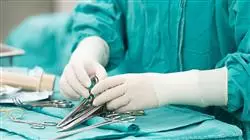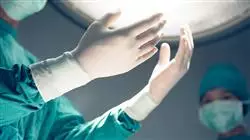University certificate
The world's largest faculty of nursing”
Introduction to the Program
Improve your knowledge through this program, where you will find the best didactic material with real clinical cases. Learn here about the latest advances in the specialty to be able to perform a quality practice”

Each of the wide variety of surgical interventions that are performed requires a specific procedure, a specific technique and the exclusive surgical material for that intervention. One thing they all have in common is a series of steps and rules that all team members should know in detail. They must also know the general functioning of the surgical department in order to prevent and avoid common risks while carrying out professional work. Healthcare institutions are well aware of this and demand academic profiles with a specialization that adapts to the requirements of the job and professionals who are qualified and endorsed to carry out the work.
This Postgraduate diploma contains the most complete and updated scientific program on the market, with the main objective of training in generic and specific competencies in a surgical process and facilitates the updating of the professional in a practical way and adapted to their needs. The modules that make up this course are aimed at updating the knowledge of nursing professionals who already perform their functions in the surgical field and for those new professionals who wish to develop their functions in the surgical field where a high qualification is required and increase their professional competence in the provision of surgical nursing care to the patient, before, during and after surgery in a holistic manner.
The innovative educational method, which includes real clinical cases and exercises to bring the development of the program closer to the surgical practice, is based on Problem Based Learning, by means of which the student must try to solve the different professional practice situations that arise during the program. For this reason, you will be assisted by an innovative interactive video system created by renowned and experienced experts in the field of radiology with extensive teaching experience. This ensures that the professional, whether or not they have worked in any of the sections that make up the perioperative process, integrates into their work practice the experience of professionals already working in leading hospitals at a national and international level with a high scientific, technological and humanistic level.
This knowledge will facilitate the provision of quality care throughout the surgical process to ensure the safety of the patient and the professional at all times.
Increase your skills in the approach to neurosurgery and ophthalmic surgery for nursing through this program"
This Postgraduate diploma in Neurosurgery and Ophthalmic Surgery for Nursing urinary contains the most complete and up-to-date scientific program on the market. The most important features of the program include:
- Clinical cases presented by experts in the different specialties. The graphic, schematic, and eminently practical contents with which they are created provide scientific and practical information on the disciplines that are essential for professional practice
- News on neurosurgery and ophthalmic surgery for nurses
- Algorithm-based interactive learning system for decision-making in the presented clinical situations
- With special emphasis on evidence-based health and surgical nursing research methodologies
- All this will be complemented by theoretical lessons, questions to the expert, debate forums on controversial topics, and individual reflection assignments
- Content that is accessible from any fixed or portable device with an Internet connection
This Postgraduate diploma may be the best investment you can make in the selection of a refresher program for two reasons: in addition to updating your knowledge in neurosurgery and ophthalmologic surgery, you will obtain a Postgraduate diploma from TECH Global University"
Forming part of the teaching staff is a group of professionals in the world of surgical nursing who bring to this specialization their work experience, as well as a group of renowned specialists, recognised by esteemed scientific communities.
The multimedia content developed with the latest educational technology will provide the professional with situated and contextual learning, i.e., a simulated environment that will provide immersive training program to train in real situations.
This program is designed around Problem Based Learning, whereby the physician must try to solve the different professional practice situations that arise during the course. For this reason, you will be assisted by an innovative, interactive video system created by renowned and experienced experts in the field of surgical nursing with extensive teaching experience.
Increase your decision-making confidence by updating your knowledge with this Postgraduate diploma in Neurosurgery and Ophthalmologic Surgery for Nurses"

Don't miss the opportunity to update your knowledge in neurosurgery and ophthalmologic surgery to improve patient care"
Why study at TECH?
TECH is the world’s largest online university. With an impressive catalog of more than 14,000 university programs available in 11 languages, it is positioned as a leader in employability, with a 99% job placement rate. In addition, it relies on an enormous faculty of more than 6,000 professors of the highest international renown.

Study at the world's largest online university and guarantee your professional success. The future starts at TECH”
The world’s best online university according to FORBES
The prestigious Forbes magazine, specialized in business and finance, has highlighted TECH as “the world's best online university” This is what they have recently stated in an article in their digital edition in which they echo the success story of this institution, “thanks to the academic offer it provides, the selection of its teaching staff, and an innovative learning method aimed at educating the professionals of the future”
A revolutionary study method, a cutting-edge faculty and a practical focus: the key to TECH's success.
The most complete study plans on the university scene
TECH offers the most complete study plans on the university scene, with syllabuses that cover fundamental concepts and, at the same time, the main scientific advances in their specific scientific areas. In addition, these programs are continuously being updated to guarantee students the academic vanguard and the most in-demand professional skills. In this way, the university's qualifications provide its graduates with a significant advantage to propel their careers to success.
TECH offers the most comprehensive and intensive study plans on the current university scene.
A world-class teaching staff
TECH's teaching staff is made up of more than 6,000 professors with the highest international recognition. Professors, researchers and top executives of multinational companies, including Isaiah Covington, performance coach of the Boston Celtics; Magda Romanska, principal investigator at Harvard MetaLAB; Ignacio Wistumba, chairman of the department of translational molecular pathology at MD Anderson Cancer Center; and D.W. Pine, creative director of TIME magazine, among others.
Internationally renowned experts, specialized in different branches of Health, Technology, Communication and Business, form part of the TECH faculty.
A unique learning method
TECH is the first university to use Relearning in all its programs. It is the best online learning methodology, accredited with international teaching quality certifications, provided by prestigious educational agencies. In addition, this disruptive educational model is complemented with the “Case Method”, thereby setting up a unique online teaching strategy. Innovative teaching resources are also implemented, including detailed videos, infographics and interactive summaries.
TECH combines Relearning and the Case Method in all its university programs to guarantee excellent theoretical and practical learning, studying whenever and wherever you want.
The world's largest online university
TECH is the world’s largest online university. We are the largest educational institution, with the best and widest online educational catalog, one hundred percent online and covering the vast majority of areas of knowledge. We offer a large selection of our own degrees and accredited online undergraduate and postgraduate degrees. In total, more than 14,000 university degrees, in eleven different languages, make us the largest educational largest in the world.
TECH has the world's most extensive catalog of academic and official programs, available in more than 11 languages.
Google Premier Partner
The American technology giant has awarded TECH the Google Google Premier Partner badge. This award, which is only available to 3% of the world's companies, highlights the efficient, flexible and tailored experience that this university provides to students. The recognition as a Google Premier Partner not only accredits the maximum rigor, performance and investment in TECH's digital infrastructures, but also places this university as one of the world's leading technology companies.
Google has positioned TECH in the top 3% of the world's most important technology companies by awarding it its Google Premier Partner badge.
The official online university of the NBA
TECH is the official online university of the NBA. Thanks to our agreement with the biggest league in basketball, we offer our students exclusive university programs, as well as a wide variety of educational resources focused on the business of the league and other areas of the sports industry. Each program is made up of a uniquely designed syllabus and features exceptional guest hosts: professionals with a distinguished sports background who will offer their expertise on the most relevant topics.
TECH has been selected by the NBA, the world's top basketball league, as its official online university.
The top-rated university by its students
Students have positioned TECH as the world's top-rated university on the main review websites, with a highest rating of 4.9 out of 5, obtained from more than 1,000 reviews. These results consolidate TECH as the benchmark university institution at an international level, reflecting the excellence and positive impact of its educational model.” reflecting the excellence and positive impact of its educational model.”
TECH is the world’s top-rated university by its students.
Leaders in employability
TECH has managed to become the leading university in employability. 99% of its students obtain jobs in the academic field they have studied, within one year of completing any of the university's programs. A similar number achieve immediate career enhancement. All this thanks to a study methodology that bases its effectiveness on the acquisition of practical skills, which are absolutely necessary for professional development.
99% of TECH graduates find a job within a year of completing their studies.
Postgraduate Diploma in Neurosurgery and Ophthalmic Surgery for Nursing
In the health field, specialization is key to provide quality and up-to-date care. TECH Global University presents the Postgraduate Diploma in Neurosurgery and Ophthalmic Surgery for Nursing, a unique opportunity to enhance your knowledge and skills in key areas of nursing. Our program stands out for its practical and up-to-date approach, giving nursing professionals the tools they need to excel in the fields of neurosurgery and ophthalmic surgery. With online classes, we have eliminated geographic and time barriers, allowing you to access content from anywhere, anytime. At TECH, we understand the importance of flexibility in continuing education. Online classes not only provide you with convenience, but also allow you to adjust your learning according to your own pace and schedule. Our faculty, made up of leading professionals in their respective fields, will guide you through the most critical aspects of neurosurgery and ophthalmic surgery.
Enhance your knowledge at the best school of nursing
The Postgraduate Diploma in Neurosurgery and Ophthalmic Surgery for Nursing addresses key topics, from specific surgical procedures to specialized postoperative care. You'll gain a comprehensive understanding of the latest technologies and advances in these disciplines, enhancing your ability to provide quality care and support to patients. Upon successful completion of the program, you will receive a recognized certificate highlighting your expertise and dedication in neurosurgery and ophthalmic surgery. This achievement will not only enrich your professional profile but also open up new opportunities and challenges in the field of specialized nursing. Take the next step in your career and become a leader in neurological and ophthalmic care. Enroll today in the Postgraduate Diploma in Neurosurgery and Ophthalmic Surgery for Nursing from TECH Global University and unleash your potential in health care.







